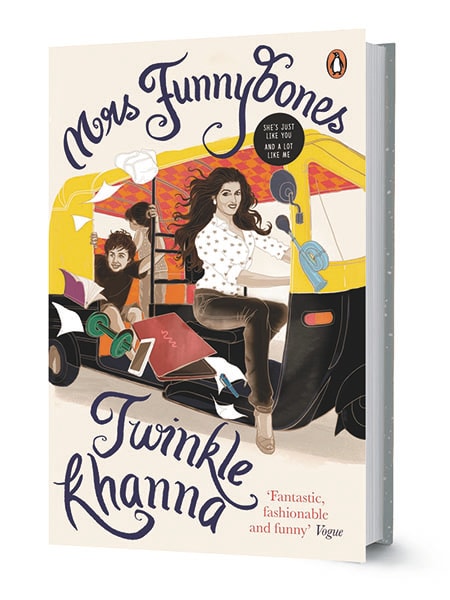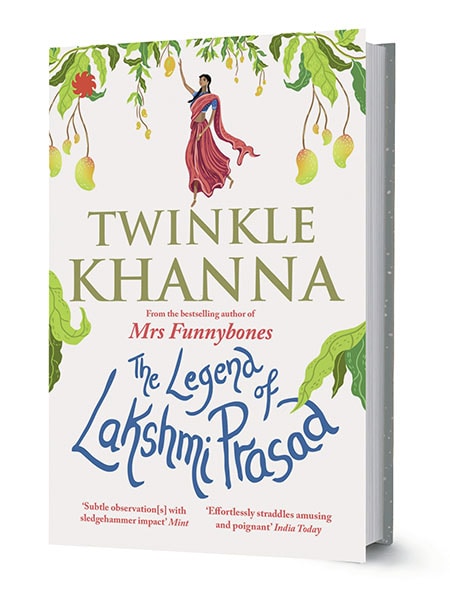Twinkle Khanna's write of passage
The author on the impact of words, battling gnat infestations, and how she almost became a stand-up comic


Twinkle Khanna had planned to become a writer at 60. If life has changed her plans, it is only in that the timeline has been advanced
When she was young, Twinkle Khanna had plans to become a writer at 60. She even had her look sorted. Somewhere in the back of her head, she says, “I used to always have this vision that when I would be 60… I had the look ready, short white hair, short nails, and I’d wear a white kurta and I’d be going on my scooter in Goa and my kids will be grown up and all of that... So I knew that I would eventually do that. I just thought I’d be much smarter at 60, I’d have more to say.”
The scooter (a yellow Bajaj) is already parked in Goa, the world of words has been in place since she was a kid, so if life has changed her plans, it is only in that the timeline has been advanced. Khanna, 43, started writing a few years ago, when a friend approached her to pen a celebrity column for a newspaper. “She came to me and said, ‘Why don’t you write?’ And I replied, ‘But I haven’t written anything for ages.’”
As a teenager, she recollects, she wrote poetry and half a book at 18, and then not a word for 18 years—not even a diary entry. “But she’s like, ‘You read so much, I’m sure you can write.’ I said millions of people watch cricket, doesn’t mean they can play. She said, ‘Try’. And for some reason I said yes.”
We are sitting in her office in the building at the end of ‘Akshay Kumar wali galli’ (as the locals refer to it) in suburban Juhu in Mumbai, and Khanna is talking of how her becoming a writer came about. “In the beginning, if I had to struggle through what I go through now, I would have given up. But I had so much to say at that point, it was just like I was pretty much throwing up on paper and the columns became popular… and here I am.”
Khanna’s fortnightly newspaper columns take a satirical look at life and society, her lens trained on politics, people, and issues close to her heart. Her first book, Mrs Funnybones (Penguin Books India, August 2015), was a compilation of the newspaper columns she wrote as Mrs Funnybones, with new and added material. Part fact, part fiction, the columns have characters from her family including the “man of the house” and the “prodigal son”, and have a take on everything from reactions to the controversial All India Bakchod roast of Ranveer Singh and Arjun Kapoor in 2014 to karva chauth and menstruation to, more recently, demonetisation.
For the columns, she says, she has to have an idea in place at least a week in advance so that she can ruminate over it, walk around, have her self-imposed criteria of three jokes in place, and then sit down and write.
Alongside writing the columns, managing her home, running her interior design firm The White Window and helping with her mother’s candle business The Faraway Tree, as well as interacting with businessfolk, Khanna was writing her story on two elderly sisters Noni Appa and Binni. This was initially meant to be a saga but 10 chapters down the line, she came across Arunachalam Muruganathan, a social entrepreneur and inventor of a low-cost sanitary pad-making machine. Menstruation being an issue close to her heart, she decided to write about him instead, and swapped the saga for short stories. Khanna, with husband actor Akshay Kumar and director and scriptwriter R Balki, has now started work on a film to be based on Muruganathan.
“Menstruation has always been one of my, sort of, one of my… things that I keep railing against, these taboos against menstruation. In fact, you must have passed by this temple right there, there’s a board there that [says] you are not allowed to go there if you’re menstruating. It’s crazy and it’s right here, it’s touching my gate wall,” she says. “And so here was a chance for me to do something about it, and to write it in a fictionalised manner where it would reach more people, because fiction tends to, and make a point about it at the same time... So then I started writing that and then I began chasing him, Muruganathan.”
He was extremely difficult to get hold of, but she was intent and persisted. “I think finally, something, some part of my brain, must have gone crazy because I just started calling him every day, wherever I was in the world, I would just call him. Every morning. And finally, he picked up the phone and he was in London and I was in [another part of] England and then, you know, he tried to fob me off by saying I’m in London so I’ll see you when I come back, and I was like no, no, I’m driving down.” She went and met him and convinced him that they should write the story. “And then do a movie about him, Padman, which is my first production actually and that was it.”
Besides strong female characters, another theme that runs through her work is her concern for the environment. In the title story of The Legend of Lakshmi Prasad she tackles both, the issue of the girl child and the planting of trees. In the other stories, wildlife sanctuaries, trees and flowers, and garden departments find their way in. “For some reason all the stories had trees which played an important part,” she says.  Khanna says her mother Dimple Kapadia (left) keeps her grounded. “I can never walk with my nose up in the air my mother’s there to point out something is in my nostril.”
Khanna says her mother Dimple Kapadia (left) keeps her grounded. “I can never walk with my nose up in the air my mother’s there to point out something is in my nostril.”
Image: Jafar Khan / FotocorpThe love of trees is not restricted to fiction. She is actively involved in Rastaa Chaap, an organisation that paints and plants trees and draws attention to the deteriorating environment in the city. Besides, she is also into organic gardening. “In some way, in school, I was a rebel all the time. Now I’m a rebel without a cause, so I guess I found other causes. I have lots of other causes, and so I take up challenges. You know a lot of people don’t seem to see for example, the leader of the First World doesn’t see climate change, but it’s there, so with Rastaa Chaap we work tirelessly to kind of do things, plant things.”
She stands up and walks to the balcony to show us her garden from above. And in a case of sort-of life imitating art, goes on to tell us how the manure got infested with gnats that were biting everyone, and how everyone was blaming her for “another harebrained scheme”. “This was something that my son [Aarav, 14] was very keen on and we did it, and then finally because I’ve to also give it gobar and things like that, we got this massive infestation of gnats, which are biting everybody. So we’re taking mosquito rackets and we’re trying to kill them, but we’ve got all these bites. Can you see my toes, can you see all these?” she says pointing to her feet.
“And now my son is waiving off responsibility and my husband is yelling at me,” she says, laughing, “at my harebrained schemes. But, poor thing, with a racket even he is killing them. They’re biting the baby [daughter Nitara, four], they’re biting the dog, who has a wound, so my dog is walking around with this collar so he won’t keep biting at the wound, and they’re all blaming me, and I was telling my son that this was your idea, and he’s like, ‘I have many ideas but you only take the ones you like so this is your fault.’ So, ya, sometimes my life does follow Mrs Funnybones pretty closely.”
And it seems to happen every once in a while. For all her accomplishments you’d think her son would pick her to write about for a school assignment on popular columnists. But no, he picked Chetan Bhagat. “So you know, ghar ki murghi daal barabar has happened to me,” she says with a laugh.
Khanna has a way of seeing the humour in things. When one of her initial columns went viral, she happily called her mother, actor Dimple Kapadia, but the response was far from expected. “I called her and said my column has done really well and she said have you got dishes for your kitchen? They’re not matching. Finally I said, you know, mom, I wish Hema Malini was my mother, at least I’ll get a free Kent RO [a brand endorsed by Malini]. With you what am I getting?” she says. 
Actor and husband Akshay Kumar is Twinkle Khanna’s first reader and also her biggest cheerleader
Image: Sachin GokhaleIt is her mother, she adds, who keeps them grounded. She recalls an incident in a bookshop in Khan Market, in Delhi, where she was signing books. People went up to Kapadia, telling her that her daughter was such a good writer. “And she pointed at me and screamed across the shop, ‘This junglee here?’ Even that poor person was embarrassed and I wanted to go behind a bookshelf and hope it falls on me and I die… But that’s the way she is… she’s never taken her own abilities or her fame seriously. And she… keeps us grounded. I always say I can never walk around with my nose up in the air my mother’s there to point out something is stuck in my nostril.”
However, though she might not have paid much attention to her nerdy daughter’s talents when young, now she does take note. “Now she says, ‘I should have encouraged you, you know.’ I’m like, ‘Why didn’t you?’. My mother thought that we [ Twinkle and her sister Rinke] getting into the movies was a good idea. I say, ‘Why didn’t you encourage [writing]?’” And then, Khanna, ever the pragmatic, practical one, throws that thought out of the window. “I think to myself, what if I had seen that sort of success in my twenties and it was all gone by my forties—that would be rather disheartening. I’m glad it came at this point. It at least hit the midlife crisis right out of the orbit, right?”
It is perhaps this mix of vulnerability and strength, of knowing and yet questioning, of being wise and yet always the student, of being everywoman, which makes her stand out and, at the same time, helps everyone connect with her. Her voice, says her editor Chiki Sarkar, founder and publisher of Juggernaut Books, like all great voices, holds a bunch of opposing qualities. “On the one hand very relatable, she could be the girl next door, on the other hand very wise, serious but light. Funny but thoughtful,” she says.
“She is genuinely clever and that makes her very special,” says writer, columnist and filmmaker Pritish Nandy, adding that she has a unique sense of humour. “No one can be funny like her. Yet she always makes a serious point. Often a brave point. And she always says it in style. A style that is entirely her own. Her main theme is how women see the world around them. She is the centre of her universe and that is how she gives it a special spin.” Her fiction and non-fiction, he says, share the same world view, differently posited. “In that sense it’s a common universe. And even though she raises the same ideas, she is never preachy, thank God. She is funny.”
undefinedThere are just two things we need to do: One is to make a difference, and the other is to entertain ourselves.[/bq]
She can “actually take the pants off someone without them even realising this”, adds filmmaker Karan Johar whose association with Khanna goes way back, from plotting his escape from the boarding school they both attended, to him writing a part for her in his first film. “She’s not offensive. It’s an art form, the way she does it, and you know you can chuckle at it, have a good laugh at it, and she’s not really making any commentary that would offend any individual party, person, group, I mean nothing… she always walks the tightrope and walks it really well.”
Ask Khanna about this innate ability to crack jokes, and she says it’s how she’s always been. “I make jokes all the time, you know, even aside from writing jokes in my columns. I’ve been in trouble all my life because of this. It’s also been my saving grace because we are all here for a very short time and there are just two things we need to do: One is to make a difference, and the other is to entertain ourselves! What else are we supposed to do?”
So much so that she even considered becoming a stand-up comic, though her husband talked her out of that. Kumar, who admires her bravery and her work, is her first reader and her biggest cheerleader. “I enjoy reading what my wife has to say, whether it’s worthy or just plain silly, because that’s what is so magical about her,” he says. “She brings an epic opinion to the table, be it serious or hilarious, every single time.”
Johar remembers her as a bright, sharp kid who was always top of the class. “I’m glad she platformed her talent… What I’m glad she’s done is she has managed to break through the shackles of the perceived image that star wives tend to have, to kind of ride on the popularity of their husbands,” he says. “Actually, she has broken that because she has such a strong individual voice, that she has emerged to become an individual of her own... Twinkle Khanna is a self-created brand within her own parameters of talent and ability. And I think today she does not need the baggage of her lineage [mother Kapadia and father, late actor, Rajesh Khanna] or her husband to further her brand. Her own work will speak for itself,” he points out adding that it all comes from her being a voracious reader, from her insight, from her sense of self, her awareness and her powers of observation.
A passionate reader, Khanna says all the books she has read have changed her life. “Everything I am is an amalgamation of what I’ve read, what I’ve been through. I don’t really have a, you know, uh, a sort of, ‘Ok, I’ll read this genre and that genre’. Science fiction is, of course, my love, and I read that every single night. But aside from that I’m reading because my brain needs it. I need to. Also, I think I need to constantly keep evolving and improving and getting more aware. I really don’t know of any other medium, besides reading, that does that for you.”
Does she read when she’s writing? “I know it affects the way they [writers] write… so I do two things. I read the best writers in the world right now and then I despair. And then I read pretty much the worst writers [laughs] in the world and I make myself happy. So I do both these things.”
Meanwhile, writing not only continues to help her get her point across, but also helps her make sense of the world. “I think it’s changed me. You end up thinking a lot more about various things than you would have. Things in the world, things that matter, things that don’t, and your attitude towards things, towards values, even towards gender, the more I think about it, the more I realise the challenges,” she says. “I read somewhere yesterday that a viewpoint is you standing on the hill and looking at the perspective, whereas prejudice is being sunk in a hole. So I think, for me, what’s changing is that I’m climbing up a hill to look from the vantage point. I haven’t reached the top, but I’m trying to get there. Makes sense?” she asks, again. Yes, it does.
First Published: Apr 23, 2017, 07:20
Subscribe Now
